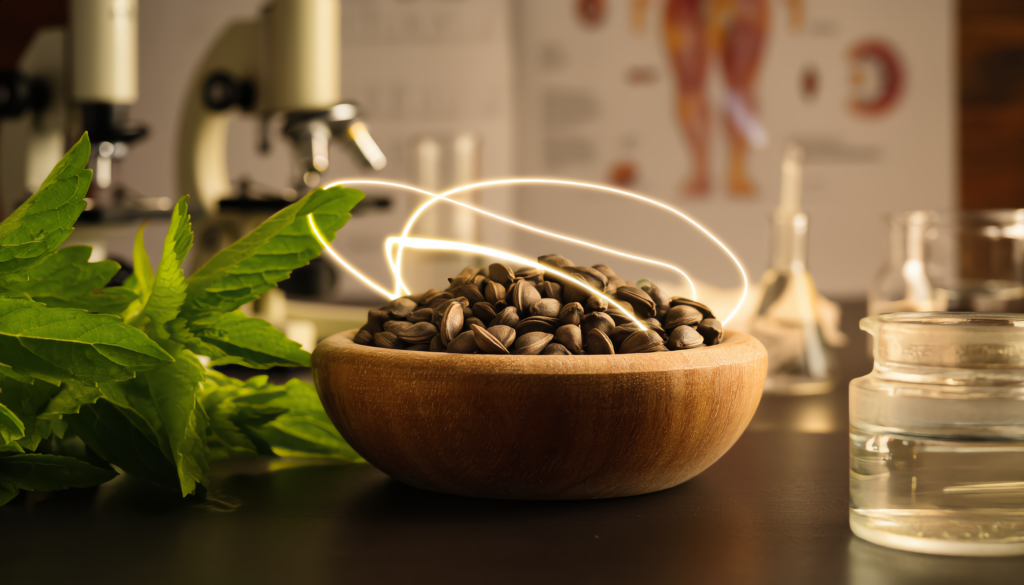If you’re on a quest for natural remedies that do more than just scratch the surface, let’s talk about Harad—or more formally, Terminalia chebula. This humble seed (and fruit) is a superstar in Ayurveda, Siddha, Unani, and Tibetan medicine, and modern research is finally catching up to what traditional healers have known for centuries: Harad is a true multitasker. From soothing gut infections to balancing blood sugar, this “King of Medicines” is packed with benefits that might just make you want to add it to your wellness routine.
So, grab a cup of herbal tea (maybe with a pinch of Harad powder?), and let’s dive into the miraculous world of Harad seed, its uses, the science behind its powers, and why it’s earned its royal reputation.
What are Harad Seeds? Meet the “King of Medicines”
Harad, also known as Terminalia chebula, black myrobalan, or Chebulic myrobalan, is a fruit-bearing tree native to South Asia. Its seeds and fruit are used extensively in traditional medicine systems, earning it the nickname “King of Medicines” in Ayurveda. But what makes it so special? Let’s break it down.
The Secret Sauce: Phytochemicals and Active Compounds in Harad Seeds
Harad is loaded with bioactive compounds, including:
- Hydrolysable tannins (chebulic acid, chebulinic acid, chebulagic acid, ellagic acid, gallic acid)
- Terpenoids
- Polyphenols
- Flavonoids
These compounds are responsible for Harad’s antioxidant, anti-inflammatory, antimicrobial, antidiabetic, and immunomodulatory properties. In other words, Harad doesn’t just do one thing—it does a lot of things, and it does them well.
Using Harad Seeds For Gut Health: From Infections to Regularity
Fighting Gut Infections
Harad is a go-to remedy for a range of gastrointestinal issues, from indigestion and constipation to more serious infections. Its seeds and fruit have been shown to have potent antibacterial, antiviral, and antifungal properties, making them effective against pathogens like Salmonella, E. coli, Clostridium perfringens, Staphylococcus aureus, and even Helicobacter pylori—the bacteria behind stomach ulcers and gastritis.
A recent study on Tibetan yaks (yes, yaks!) showed that Harad extract could effectively treat Salmonella-induced diarrhea and dysentery in mice. It reduced pro-inflammatory cytokines (like IL-1β, IL-6, IL-8, and TNF-α), increased anti-inflammatory cytokines (like IL-4 and IL-10), and improved antioxidant levels in the body. Even more impressively, it helped heal gastric and intestinal tissue damage and had no toxic effects on the liver or kidneys.
Using Harad Seeds For Promoting Digestive Health
Harad isn’t just about fighting off bad guys—it’s also a gentle helper for your gut. The oil from Harad seeds is known to improve gastrointestinal motility, promoting regular bowel movements and easing chronic constipation. In Ayurveda, Harad is considered a tridosha balancer, meaning it helps harmonize the body’s three fundamental energies (Vata, Pitta, and Kapha), which is key for optimal digestion and overall health.
For those struggling with indigestion, constipation, or even hemorrhoids, Harad powder mixed with water or buttermilk is a traditional remedy that’s stood the test of time.
Harad Seeds For Blood Sugar and Metabolic Health: A Natural Regulator
Harad Seeds Antidiabetic Effects
One of the most exciting areas of Harad research is its potential to help manage blood sugar. Animal studies have shown that Harad fruit and seed extracts can significantly reduce blood glucose levels, sometimes even outperforming standard diabetic medications like glibenclamide.
How does it work? Harad appears to enhance insulin secretion from the beta cells of the pancreas, improve glucose metabolism, and protect against oxidative stress—a key player in diabetes complications. Its antioxidant properties help neutralize free radicals that can damage cells and worsen insulin resistance.
Using Harad Seeds For Cardiovascular and Liver Protection
Harad’s benefits don’t stop at blood sugar. Its antioxidant and anti-inflammatory properties also support heart health by reducing cholesterol levels, protecting blood vessels, and improving overall cardiovascular function. Additionally, Harad has shown liver-protective effects in animal studies, helping to prevent liver cell toxicity and support detoxification.
Using Harad Seeds For Immune Boosting and Beyond
Immunomodulatory and Antioxidant Power
Harad is a natural immune booster. Its antioxidant compounds help reduce cell damage and support the body’s defenses against infections and chronic diseases. Regular consumption of Harad powder is believed to enhance immunity, making you less prone to frequent illnesses.
Anti-inflammatory and Anti-aging
Chronic inflammation is at the root of many modern diseases, from arthritis to heart disease. Harad’s anti-inflammatory properties help calm inflammation throughout the body, making it useful for conditions like arthritis and inflammatory bowel disease. Its antioxidant activity also contributes to anti-aging effects, protecting cells from oxidative damage and supporting overall vitality.
Using Harad Seeds For Skin and Wound Healing
Harad isn’t just for internal use. Applied topically as a paste (often mixed with coconut oil), Harad powder can help heal wounds, treat skin infections, and even manage certain eye diseases. Its astringent, antimicrobial, and anti-inflammatory properties make it a versatile remedy for skin health.
Traditional Uses Harad Seeds and It’s Modern Validation
Ayurveda and Beyond
In Ayurveda, Harad is used in a variety of ways depending on the condition:
- Chewed raw: Improves digestion
- Made into a paste with water: Acts as a mild laxative
- Cooked or steamed: Useful for malabsorption syndromes
- Fried with oils or ghee: Balances all three doshas (Vata, Pitta, Kapha)
It’s also a key ingredient in Triphala, a famous Ayurvedic formula for detoxification and rejuvenation1.
Modern Research Of Harad Seeds
Modern science has validated many of Harad’s traditional uses. Studies have confirmed its antibacterial, antifungal, antiviral, anti-inflammatory, antioxidant, antidiabetic, cardioprotective, and hepatoprotective properties. While more human trials are needed, the existing evidence is promising and supports Harad’s role as a multifaceted natural remedy.
How to Use Harad Seeds: Practical Tips
Ready to give Harad a try? Here are some practical ways to incorporate it into your routine:
- Harad Powder: Mix 1–3 grams of Harad powder with warm water and drink it once or twice daily for digestive health, immune support, or detoxification.
- Harad Oil: Used topically for skin conditions or taken internally (under guidance) for gastrointestinal motility.
- Harad Paste: Mix Harad powder with coconut oil and apply to wounds or skin infections.
- Triphala: Look for supplements containing Harad as part of the Triphala blend for overall wellness.
- Harad with Buttermilk or Jaggery: Traditional remedies for hemorrhoids or digestive issues.
Safety and Precautions Of Using Harad Seeds
Harad is generally safe for most people when used in moderation. However, excessive consumption can cause diarrhea or digestive discomfort, especially in sensitive individuals. If you have liver problems, diabetes, or are pregnant, consult your healthcare provider before using Harad or any herbal remedy.
The Bottom Line: Why Harad Seeds Deserves the Hype
From gut infections to blood sugar regulation, Harad seed and fruit are true powerhouses of natural medicine. Its rich blend of bioactive compounds gives it a wide range of health benefits, backed by both ancient wisdom and modern science. Whether you’re looking to support your digestion, boost your immunity, manage blood sugar, or heal your skin, Harad is a versatile and effective ally.
So, the next time you hear about the “King of Medicines,” you’ll know exactly why Harad has earned its crown.








